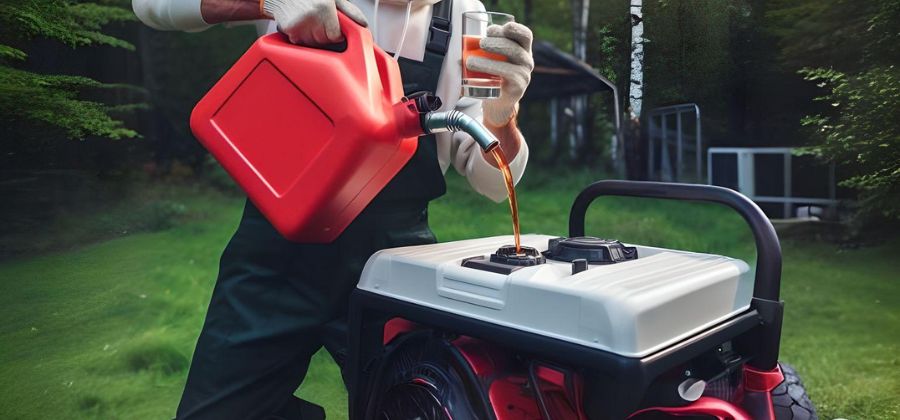
Premium gas stands out from regular gas primarily due to its higher octane level. This higher octane rating means it can withstand more compression before igniting, reducing the risk of engine knock – a common issue in high-performance engines.
Typically, premium gas has an octane level of 91 or higher, compared to regular gas which usually sits around 87.
This difference in octane levels is the reason for its higher price point. People often consider using premium gas in generators for several reasons.
The foremost is to prevent engine knock, especially in generators designed for higher compression ratios. Engine knock can be damaging over time, leading to costly repairs. Another reason is the potential for improved fuel efficiency. While this varies based on the engine type and usage, some generators may run more efficiently on premium gas, translating to longer running times per gallon.
In some high-performance generators, using premium gas can lead to a slight boost in power, which can be pivotal in situations where maximum output is needed.
While premium gas is more expensive, its benefits like reduced engine knock, potential for better fuel efficiency, and increased power make it a consideration for generator users.
What is Engine Knock and How can Premium Gas Prevent it?
Internal combustion engine knocks or engine detonation can be a challenging issue—the knocking or pinging sound that occurs due to the untimely ignition of air-fuel mixture into the engine’s cylinders. The pre-combustion of fuel which
happens early causes inconveniences for the normal functioning of this mechanism.
For optimum performance of the engine, the air-fuel mixture is expected to ignite at a particular point of the cycle. However, pre-ignition can occur when there is engine overheating or under conditions of a high compression ratio and wrong ignition
timing. This results in a shockwave traveling upwards and hitting against the upward motion of the piston causing it to knock which is the reason behind the characteristic knocking sound.
However, engine knock is much more than a noise problem –it may damage the engine. Hot spots within the cylinder are created due to the shock waves of premature combustion that might cause overheating leading to the destruction of piston rings and cylinder walls. Wear and tear is more pronounced in such engines due to this damage resulting in a reduction of the engine’s lifespan. If this problem is not resolved, continuous knocks may result in irreparable damage to an engine which will be expensive to repair.
How to Prevent?
You can use premium gasoline which can help in avoiding engine knock. The critical aspect is the octane rating of the fuel (Octane rating represents a fuel’s tendency to knock), which for regular gas is normally in the vicinity of 87, whereas premium gas is often rated at 91-plus.
Premium gas has a higher octane rating because it’s able to resist elevated pressure and temperature levels in the engine without early ignition. Such opposition to early spark is important for a highly performing engine as well as an overloaded one which is predisposed to the phenomenon.
How Does Premium Gas Affect the Fuel Efficiency and Power Output of a Generator?
Using premium gasoline in a generator, which typically has a higher octane rating like 91 or 93, can influence its fuel efficiency and power output in a variety of ways. Octane rating is a measure of a fuel’s ability to resist “knocking” or “pinging” during combustion, caused by the air-fuel mixture detonating prematurely in the engine. In high-compression engines, which are sometimes used in generators, knocking can be a significant issue. Premium gas, by virtue of its high octane, mitigates this risk, ensuring smoother and potentially more efficient combustion.
As discussed before, the impact of premium gas on a generator’s efficiency and power output is most pronounced in models that are specifically designed to utilize high-octane fuel. In such generators, the advanced ignition timing and compression
ratios can harness the high-octane fuel’s properties to achieve better performance. This can translate into a modest increase in power output and operational efficiency.
Effects of Premium Gas on a Generator
As of now, the majority of generators are designed for regular gas; the switch to premium gasoline might not yield significant improvements in efficiency or power. The improvement in efficiency is typically marginal and may not justify the higher cost associated with premium gasoline.
1. Burns cleaner and reduces carbon buildup
One advantage of premium gas is that it burns cleaner and doesn’t leave as much carbon buildup inside the engine to help keep the engine conditioned and perhaps extend its life span. Nevertheless, it should be balanced by the extra price of premium fuel because for some standard generators; this cost may not be related to an increased engine’s life span or effectiveness.
2. Eco-friendly
Premium gasoline might produce slightly fewer emissions due to its cleaner-burning nature, which is much needed in stringent environmental regulations. What hinders its usage in such areas is the economic cost it holds.
3. Reliable operation
In cold climates, the benefits of premium gas may extend to starting your generator easily as the high-octane fuel can prevent problems that often occur during cold start-ups. This ensures reliable operation in crisp conditions. During demanding situations or when a generator is subjected to heavy loads, premium gas might provide more consistent performance, maintaining power output under challenging conditions.
I’m here to dispel a myth for you. Premium gas always leads to better fuel efficiency and power. Its benefits are most noticeable in engines designed for high-octane fuel. For most generators, especially those not designed for premium gas, the use of such fuel is unlikely to offer substantial improvements in performance or efficiency.
Disadvantages of Using a Premium Generator
- Cost Factor: Premium gas is significantly more expensive than regular gas. This cost difference becomes more pronounced during emergencies or shortages when fuel prices generally rise. Opting for premium gas can lead to higher operating costs for the generator.
- Storage Factor: Premium gas typically has a shelf life of about 12 months. To maintain its quality over this period, it requires proper storage conditions, including suitable containers and stabilizers. This need for additional storage precautions to prevent degradation and contamination can be inconvenient and may incur extra costs.
- Availability Factor: In certain areas or situations, premium gas may not be readily available. This limited accessibility can be problematic, especially in emergency scenarios where fuel is urgently needed. Users might have to resort to alternative fuel sources or adapt their equipment to use different types of fuel, which can be both inconvenient and costly.
Conclusion
Premium gas that has a higher octane rating is likely to lead to lower knock of an engine; the potential for improved fuel efficiency, and increased power supply.
Perhaps, its benefits for generators depend on the situation.
It displays efficiency mainly when used on top-of-the-range, power-producing devices developed for premium fuels. The price premium for premium gas is too high compared with the benefits provided by these fuels when used in standard generators.
The cost of transportation, storage requirement, and availability are equally important determining factors when it comes to considering this fuel for generator application. Basically, using costly gas in generators should be tailored to the needs of a respective generator, weighing its profits and the costs involved.
Frequently Asked Questions
Can I put 91 octane in my generator?
Yes, you can put 91-octane fuel in your generator. Higher octane fuel like 91 burns more efficiently and is cleaner than lower octane fuel. Using it could be beneficial for your generator’s performance and longevity.
Kindly, always check the manufacturer’s recommendations for fuel types. If your generator is designed for regular unleaded gasoline (usually 87 octane), using 91 octane won’t harm it. It might be more expensive without significant performance benefits in such cases.
What happens if you put 93 instead of 95 in a generator?
The generator might produce slightly less power due to the lower octane rating and there could be a small risk of engine knocking, especially if the generator is designed specifically for higher octane fuel. For most generators, there won’t be significant damage. However, the efficiency might decrease slightly, but this is usually not a major concern.
Is it OK to use premium gas in small engines?
Using premium gas in small engines is generally not necessary and offers no benefit. Small engines, like those in lawnmowers or generators, are usually designed for regular unleaded gasoline. Premium gas has a higher octane rating, but this doesn’t improve performance or efficiency in engines not designed for it. In fact, using premium gas in small engines that don’t require it can be a waste of money. Always check the manufacturer’s recommendations for your specific engine to ensure proper fuel use.








